Suchergebnisse
IEA Demand Side Management Task 17: Integration von verbraucherseitigen Maßnahmen, Verteilter Erzeugung, Erneuerbare Energien und Energiespeicher (Phase 3)
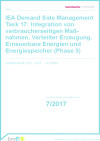
Schriftenreihe
7/2017
Matthias Stifter, Tara Esterl, Stephanie Kaser, Werner Friedl, Sara Ghaemi
Herausgeber: BMVIT
Deutsch, 37 Seiten
Downloads zur Publikation
IEA DSM Spotlight Newsletter 70 - September 2018

Der aktuelle Newsletter behandelt den Beitritt der ISA zum IEA DSM Task 24, Ansätze zur Messung und Verifizierung von Energieeffizienzprojekte, die Energiewende in Australien sowie Ergebnisse des Projekts IndustRE.
Herausgeber: IEA-DSM
Englisch, 13 Seiten
IEA DSM Task 24: Verhaltensänderung im Rahmen von DSM - von der Theorie zur Praxis
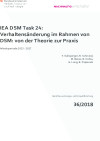
Über 20% des Energieeinsatzes bei Kleinverbrauchern können durch geänderte Verhaltensweisen eingespart werden. Bisherige Bemühungen, diese Potenziale zu erschließen, greifen vielfach zu kurz. Der Task 24 beschäftigte sich mit den wichtigsten Akteurs-Gruppen sowie mit Tools, die diese bei ihrer täglichen Arbeit unterstützen. Daneben wurde eine Bewertungsmethode für DSM-Interventionen zur Anerkennung im Rahmen des Energieeffizienzgesetzes erarbeitet.
Schriftenreihe
36/2018
T. Kallsperger, R. Schmied, M. Beran, B. Kohla, G. Lang, B. Papousek
Herausgeber: BMVIT
Deutsch, 70 Seiten
Downloads zur Publikation
IEA DSM Task 25: Geschäftsmodelle für die effektivere Markteinführung von Energiedienstleistungen
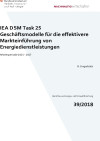
Ziel des Tasks ist die Identifizierung und Entwicklung von effektiven Geschäftsmodellen für Energiedienstleistungen, die zu einem Wachstum des nachfrageseitigen Marktes für Energieeffizienz-Dienstleistungen führen sollen.
Schriftenreihe
39/2018
R. Ungerböck, B. Papousek, G. Bucar, T. Mayrold, J. Tartler, T. Kallsperger
Herausgeber: BMVIT
Deutsch, 53 Seiten
Downloads zur Publikation
IEA Implementing Agreement Demand Side Management Task 16: Energieeffizienz- und Demand Response Dienstleistungen
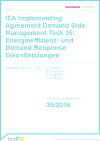
Schriftenreihe
35/2016
C. Amann, B. Papousek, R. Ungerböck, J. W. Bleyl
Herausgeber: BMVIT
Deutsch, 56 Seiten
Downloads zur Publikation
IEA DSM Spotlight Newsletter #65, Juni 2017

Im aktuellen Newsletter wird unter Anderem auf die Begriffsdefinition "demand-side management", auf den Zusatznutzen von energetischen Sanierungen sowie auf das vergangene Meeting in Dublin eingegangen.
Herausgeber: IEA DSM
Englisch, 14 Seiten
Downloads zur Publikation
IEA DSM Task 24 Phase II: Policy Brief Austria (2017)

Die Kurzfassung gibt einen Überblick über die im Rahmen des Task 24 durchgeführten Ergebnisse und Handlungsempfehlungen.
Kallsperger, T., Rotmann, S.
Herausgeber: IEA Task 24
Englisch, 2 Seiten
Downloads zur Publikation
IEA DSM Spotlight Newsletter 61, Juni 2016

Der DSM Spotlight Newsletter beschäftigt sich mit den Themen Kollaboration Task 24 und dem Projekt EBC Annex 66 sowie dem Praxisbeispiel Süd-Korea.
Pamela Murphy
Herausgeber: IEA DSM
Englisch, 6 Seiten
Downloads zur Publikation
IEA DSM Task 24: Protokoll des Workshops "Task 24" auf der Konferenz BEHAVE 2016

Das Protokoll fasst die wichtigsten Ergebnisse des Workshops „Task 24“ auf der BEHAVE Konferenz 2016 zusammen.
Dr. Sea Rotmann
Herausgeber: IEA DSM Task 24
Englisch, 16 Seiten
Downloads zur Publikation
IEA DSM Task 24 Phase II: “Once upon a time…” Eliciting energy and behaviour change stories using a fairy tale story spine (2017)

Um Theorie zu Verhaltensänderung in Pilotprojekte umzuwandeln, bedient sich der Task 24 der Methode "Storytelling". Im Artikel wird die Methode präsentiert und auf die ErzählerInnen sowie die Geschichten eingegangen.
S. Rotmann
Herausgeber: IEA DSM Task 24
Englisch
IEA Implementing Agreement Demand Side Management Task 24: Verhaltensänderung im Rahmen von DSM: von der Theorie zur Praxis Arbeitsperiode 2013 – 2015
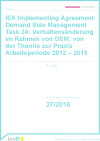
Schriftenreihe
27/2016
DI Gerhard Lang, DI Boris Papousek, Mag.a Manuela Beran, Teresa Kallsperger, MSc
Herausgeber: BMVIT
Deutsch, 103 Seiten
Downloads zur Publikation
Neue Publikationen aus dem IEA DSM Task 17
In Phase 3 des Tasks "Integration von verbraucherseitigen Maßnahmen, verteilter Erzeugung, erneuerbarer Energieressourcen und Energiespeicher" wurden 2016 vier neue englischsprachige Berichte veröffentlicht.
Publikationen im IEA DSM Task 24
Im IEA DSM Task 24 "Verhaltensänderung im Rahmen von DSM - von der Theorie zur Praxis" wurden vier Artikel bzw. Beiträge veröffentlicht.
IEA-DSM Spotlight-Newsletter #64, März 2017
Der Themenfokus des Newsletter liegt auf dem Nutzen von Verhaltensänderungen, der Wirtschaftlichkeit von Gebäudenachrüstungen sowie der Schweizer Energiestrategie 2050
IEA DSM Task 24 Phase II: ECEEE Summer Study - Workshop Minutes (2017)

Protokoll der Workshops, die im Rahmen des IEA DSM Task 24 bei der ECEEE Summer Study 2017 abgehalten wurden.
Rotmann S., Kallsperger T.
Englisch, 12 Seiten
Downloads zur Publikation
IEA UsersTCP SLA 2.0: Inclusive and Community-Oriented Approaches to a Social License to Automate (Working period 2022-2024)
The energy transition is critical in solving the climate crisis. Automated demand side management has great potential in this process but struggles with social acceptance. In SLA2.0, the role of gender and diversity factors concerning flexibility and engagement was analysed, and the potential contribution of energy communities to a social license for automation was explored. Based on the findings, flexibility profiles and recommendations were developed.
IEA DSM Spotlight-Newsletter 66, September 2017

Diese Ausgabe des Newsletters befasst sich mit einer Studie aus der USA über die tatsächlichen Kosten von Effizienzprogrammen, der zweiten IEA Energieeffizienzkonferenz sowie mit Updates aus dem IEA DSM Task 24.
Herausgeber: IEA-DSM
Englisch, 9 Seiten
Downloads zur Publikation
IEA DSM Annual Report 2016: Implementing Agreement on Demand-Side Management Technologies and Programmes
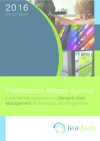
Die Inhalte des Jahresberichts 2016 umfassen neben den Statusbeschreibungen der aktuellen Tasks (Task 16, 17, 24 und 25) die derzeitigen Prioritäten des DSM generell und in den teilnehmenden Ländern.
Anne Bengtson
Herausgeber: IEA Demand-Side Management Programme
Englisch, 120 Seiten
Downloads zur Publikation
IEA DSM Annual Report 2017: Implementing Agreement on Demand-Side Management Technologies and Programmes

Die Inhalte des Jahresberichts 2017 umfassen neben den Statusbeschreibungen der aktuellen Tasks (Task 16, 24 und 25) die derzeitigen Prioritäten des DSM generell und in den teilnehmenden Ländern.
Anne Bengtson
Herausgeber: IEA Demand-Side Management Programme
Englisch, 85 Seiten
Downloads zur Publikation
IEA DSM Spotlight-Newsletter 67, Jänner 2018

Der aktuelle Newsletter befasst sich mit der Rolle der Blockchain-Technologie für den Peer-to-Peer Energiehandel, einem Programm zur Steigerung der Energieeffizienz in Indien sowie mit Updates aus dem IEA DSM Task 17.
Herausgeber: IEA-DSM, 2018
Englisch, 13 Seiten
